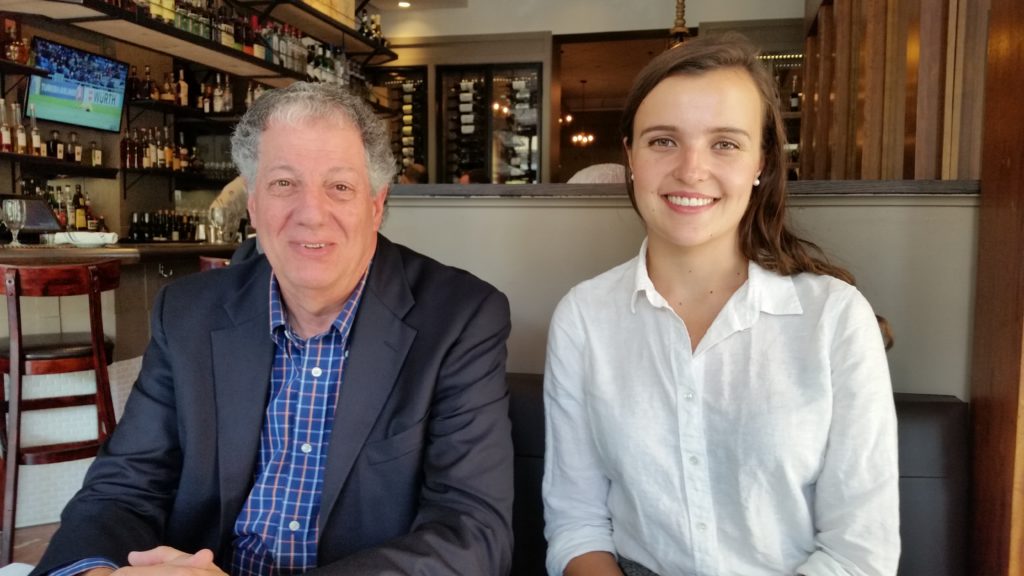When tragedy strikes, people are often inspired to develop solutions that prevent others from suffering the same fate. Such is the case with Aleksandra Desansky, SEAS ’17, recipient of the inaugural Harriet Green Tischler Endowed Scholarship. Aleksandra is pursuing a career in biomedical engineering as a result of her beloved grandmother’s increasing loss of capacity due to Alzheimer’s disease.
“As a child, I would spend all my free time with my grandmother, Banya,” says Aleksandra. “Banya was my role model, caretaker, and best friend. One morning, she went on her usual walk to the store, but did not come back.” Aleksandra later discovered that her grandmother had fallen and was taken to the hospital. “At the hospital she was diagnosed with dementia,” she says, “which later developed into full-blown Alzheimer’s.”
Aleksandra has already applied her biomedical engineering education to an exploratory concept for protecting seniors from getting lost. As a summer intern at an aerospace and defense company, she researched the Global Positioning System (GPS) and the Global Navigation Satellite System (GNSS) signal detection and characterization for the United States military. For her side project, she used GPS signal detection to create her own elderly patient tracking device and software interface.
“When I heard about the [Harriet Green Tischler] award, I knew I should apply because leveraging technology to aid older adults is why I became an engineer,” she says. “Although I didn’t end up applying my [summer] work to a medical device, I learned how GPS systems work, knowledge that will facilitate the creation of assistive devices for older adults in the future.”
It was this type of passion for helping seniors that led Howard Tischler, MS ’80, founder and CEO of Eversafe, to create the Harriet Green Tischler scholarship, an endowment named in honor of his mother. Howard’s intention was to support engineering students who were interested in using technology to enhance the lives of older adults.
His motivation? Like Aleksandra, years earlier Howard was inspired to develop a solution to a problem his own family had experienced. Shortly after Howard’s mother, Harriet, retired, she was taken advantage of by telemarketers who sold her a significant number of products she clearly didn’t need, and by a friend who wrote herself checks from Harriet’s checkbook—a downward spiral that cost Harriet her life savings. After his mother passed, Howard wanted to protect others from elder financial abuse, so he launched Eversafe, a company that detects activity outside an aging individual’s normal financial behavior and alerts designated individuals who can assist with remediating the issue.
“I believe technology can be a significant contributor to older adults being able to continue to live independently with dignity and grace,” Howard says. “Recipients of the scholarship should be interested in the aging community and what can be done with technology to maintain and sustain a senior’s quality of life.”
Along with their desire to help other people avoid similar challenges, Howard and Aleksandra also share a fondness for GW. Howard has been on the School of Engineering and Applied Science (SEAS) National Advisory Board since 2001, serving as the chair of the board from 2010 to 2012. He has taken a particular interest in entrepreneurism in SEAS, initiating a lecture series on the topic in 2011 and mentoring GW students who are developing business plans. In 2015, he was honored with a 2015 Alumni Outstanding Service Award.
About her experience at GW, Aleksandra says: “Choosing GW was the best decision I ever made. It is special to me because of my friends and the memories we share. I have had so many favorite campus experiences, but one of my favorites was having a midnight snowball fight in front of the White House.” Aleksandra is also deeply appreciative of Howard’s assistance. “Receiving the award made me grateful,” she says. “To me it means not having to take out loans for textbooks or food.”
Aleksandra reports that her grandmother’s Alzheimer’s has progressed to a point where she often does not recognize family members. Even so, Aleksandra’s Banya continues to inspire her granddaughter. “I envision a career for myself in engineering, whether it be drug evaluation or medical device creation,” Aleksandra says. “And I hope to gain experience that will allow me to one day fully assist older adults.” —Mary Follin


